
A month spent with some of Luis Buñuel's 1960s output ends with one of his most revered, the controversial 1961 drama Viridiana. Then again, "drama" doesn't exactly feel like the right word. How does one classify this picture? It's got drama, but it also has satire; it has social commentary, but is also a moral parable. It has small touches of Buñuel's usual surreal pranksterism, but yet is also restrained. The director is in complete control of his material, and he doesn't let his gadfly impulses get the better of him.
The marvelous Silvia Pinal stars as the title character. Viridiana is a young woman who has just finished her schooling at the convent. Before she takes her vows as a nun, however, her mother superior insists she go visit her ailing uncle, Don Jaime (Fernando Rey). He paid for her education, but Viridiana doesn't know him. She goes to his home reluctantly.
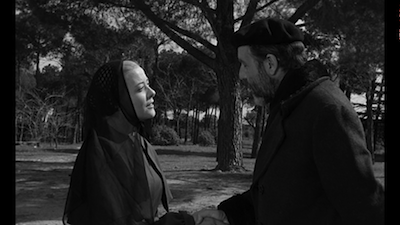
Don Jaime lives alone with his maid Ramona (Margarita Lozano), her daughter Rita (Teresita Rabal), and two handymen. He is a widower whose only child is a son born out of wedlock whom he hasn't seen in years. Viridiana does not approve of his lifestyle or his choices, but she is forgiving. Her time under his roof is pleasant, and he even indulges her idiosyncrasies. One night Don Jaime witnesses his niece sleepwalking. In this nocturnal trance, she burns her knitting yarn and pours ashes on his bed--a symbol, we are told, of both penitence and death. Don Jaime could use the former, and he is prepared for the latter. His easy acceptance of this odd behavior is partially relief. Had Viridiana been awake, she'd have seen him cross-dressing, trying on his dead wife's shoes and girdle.
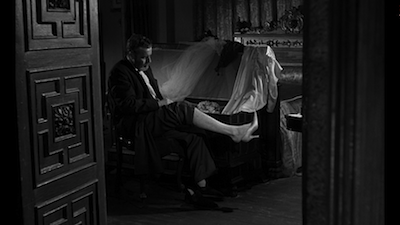

He is also thankful for the brief glimpse of Viridiana's virginal thighs. Being asleep, she wasn't aware enough to cover what was exposed. The beautiful blonde attracts plenty of attention from men. As much as the religious woman desires to blot out sin, there is a reactive impulse from the sinner to want to ruin purity. Don Jaime actually has been scheming the whole time to make Viridiana stay and marry him, replacing her aunt, whom she resembles. As much as this is a perfectly lurid melodramatic detail, it's also a carefully chosen symbol. Buñuel is warping the idea of a nun being married to her savior. There is an understated allegorical element to Viridiana where Don Jaime is God, though in this scenario, the Supreme Being is disillusioned with his creation. The noble ideals that inspired his earliest efforts have been replaced by an understandable disappointment in life, and the son he sent out into the world has done his own thing rather than continue the mission*. Rey captures this weariness and Jaime's internal conflict perfectly. His whole being appears to sag as he discusses his disillusionment. He's also equally adept at showing how he, too, is subject to base human impulses. Viridiana's romantic allegiance, might restore some of the goodness to Jaime's life, and her sexual surrender** will give him more immediate personal satisfaction.

Viridiana is caught in a hypocrisy that Buñuel quite rightly sees as systemic of organized religion. Despite a fundamental desire to do what is right, Viridiana often only does so after a guilt trip compels her to. When she attempts to take care of herself, other forces demand that she bury her own desires and give in to theirs. When she rejects Don Jaime, he resorts to drastic measures to trap her in his home.
The writing here, by Buñuel and Julio Alejandro, is sharp. It is never overbearing or obvious. The director is actively thumbing his nose at Catholicism--and Viridiana was banned by the Vatican as a result--but he's not resorting to easy polemics or, heaven forbid, preachiness. He lets the events suggest meaning; action speaks for itself. He also doesn't limit his contempt to just the church. As Don Jaime has likely figured out--and here, we can assume, so has the auteur--humanity is its own worst enemy. Religion has not just been born out of superstition and fear, but also out of a real-world need to impose some kind of moral order on the greater citizenry. Sin is real, even if God is not, and left to our own devices, we will succumb to every selfish impulse and bad behavior available.
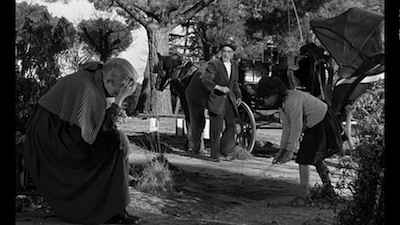
This becomes the focus of the second half of Viridiana. Traumatized by all that has happened at her uncle's home, the girl decides not to take her vows. Instead, she will stay at Jaime's house and care for the local poor. She invites the street beggars back to his place and gives them room and board, only asking for piousness and a little work in return. At the same time, the lost son, Don Jorge (Francisco Rabal), comes to take over his father's land. Don Jorge represents the modern world that Viridiana has so far avoided. He is a man of industry and doesn't like seeing his father's land going to waste. He listens to rock music and is in a relationship with a woman (Victoria Zinny) who is not his wife. He is kind to dogs, but not very compassionate toward man. And like every other male, he is attracted to Viridiana.
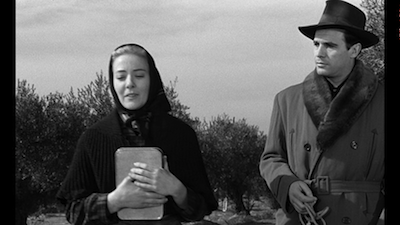
Funnily enough, for all the anti-religious readings of Viridiana, one could actually apply the opposite to the film's final act. Don Jorge's influence appears positive when you see how he transforms his father's estate, but his personal behavior often hurts people. He disregards the needs of others for his own, a trait that would be easy to blame on his money and his class position, except the disenfranchised lower classes he so disdains are no better. Despite Viridiana's kindness, the men and women she has taken under her care reward her by throwing it back in her face. The first time she leaves the farm, they break into the house and throw themselves a party. As noted in my review of The Exterminating Angel, Buñuel regularly uses dinner table scenes for both comedy and critique. The blind beggars and social misfits are a grotesque parody of how they envision the upper classes behaving. They are sloppy, over indulgent, and downright hedonistic. A leper dresses in the wedding dress of Don Jaime's widow, providing a distorted mirror image of the old patriarch's own cross-dressing. The same sickly beggar has also slaughtered a white dove, a traditional symbol of religious piety. (This is contrasted with the black bull that little Rita sees earlier in the movie, suggesting the devil is coming for them.) The feast ends with the rabble rousers posing as the diners in Leonardo da Vinci's The Last Supper. If these are Jesus' most precious disciples, are they really worth saving? (Though, credit where its due, the punchline of the joke from the woman whose "camera" will take this picture is hilarious.)
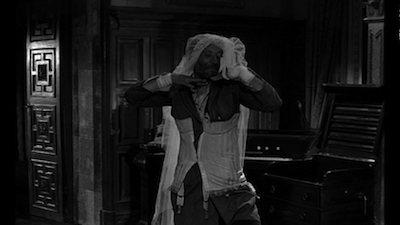
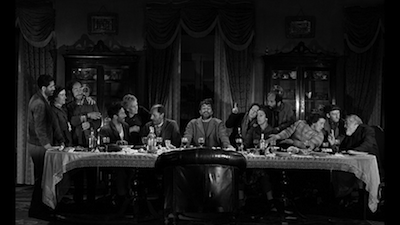
Buñuel amps up the melodrama for the scenes that follow, and the effect is disturbing. I am sure he was aware that by allowing Jorge to play the hero, he is giving the audience what they suspect they want. Indeed, even casting the square-jawed actor validates a kind of Hollywood image of a leading man. Francisco Rabal talks like Charlton Heston, and he smolders like Rock Hudson. Yet, are any of us really prepared for the true side effects? For someone to be a hero, another person has to be a victim. If we don't feel queasy seeing innocence spoiled, if we get a charge out of Jorge's coming to the rescue--as pathetic as those efforts kind of end up being--then there is something wrong with us. If we also lusted after Viridiana, if we yearned to see more of Silvia Pinal's flesh exposed, then we are no better than any of the drooling predators on the screen.
The final shot of the film is one of capitulation and defeat. There is no coming back from this trauma, no restoring old-fashioned values. The holy trinity has been replaced by a completely different sort of threesome, and this one has about as much chance of filling the existential void as its predecessor.
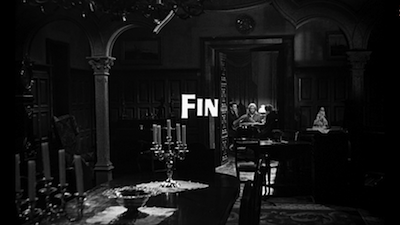
* Though the son here could also easily ask, "Father, why hast thou forksaken me?"
** I suppose one could make a case for Don Jaime's initial lie about having deflowered Viridiana being an attempted distortion of Mary's virginal impregnation, but I am not quite sure how to pull it together. An intriguing parallel, nonetheless.
BONUS BUNUEL: My reviews of discs from the director not featured in the Criterion collection:
* Susana (1951)
* Death in the Garden (1956)

No comments:
Post a Comment